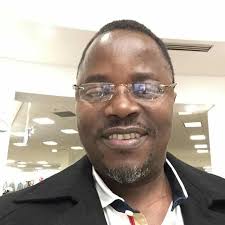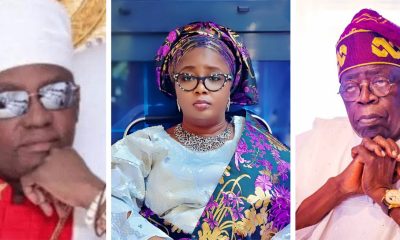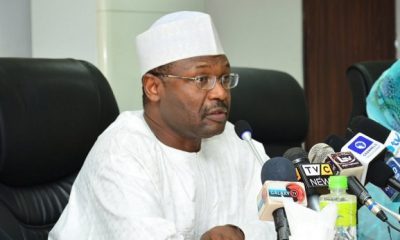Opinion
Indecency daggers culture

By Tunde Odesola
(Published in The PUNCH on Monday, January 25, 2021)
Music blared. Joy floated. Naira rained. Feet trampled. This is the spectacle of Nigerian lavish parties called owambe, a short-lived rivulet of opulence flowing into the sea of poverty.
Despite the sacred warning that the love of money is the root of all evils, man loves money, still. Money has many monikers; here are a few of them.
Apekanuko bespeaks the high esteem money holds among the Yoruba.
Ego, the Igbo magic word for money, is the fuel of commerce. It is different from ego, the personality framework and double-edged sword of Sigmund Freud that can kill or save.
When you hear the Hausa say kudi, they refer not to the unsung martyr of Nigeria’s modern democracy, Kudirat Abiola. Kudi, in Hausa language, is the password for business, and the stimulant that pumps fists in the air and opens mouth in shouts of rankadede.
“You’re dead without money,” says the English novelist, James, who can Hardley Chase nothing but Beauties, Money and Wine while cruising a BMW.
While money is, unmistakably, the oxygen that invigorates the earth, innovation is the blood coursing through its arteries. So, if money is this intrinsic to man’s wellbeing, common sense suggests that it should be treated with decorum. But this isn’t always so.
Oftentimes, money loses its dignity especially at owambe parties after gallons of alcohol had surged down the gullets to sit in the wells of stomachs and fiddle with the senses.
In a matter of minutes, earnings, salaries, overdrafts, borrowings and savings sprayed by friends, colleagues and relatives cascade from celebrants’ foreheads to the floor in moments of self-delusion.
Consultant Psychiatrist, Ladoke Akintola University, Ogbomoso, Dr. Adeoye Oyewole, isn’t fooled by such make-belief opulence.
He said, “Spraying of money is purely a materialistic display of power over others. It’s an ego trip rather than a self-transcendent expression of self. You can’t discuss the issue without looking at the fact that our leaders, whether political, academic or business, are stuck at the lowest rung of Abraham Maslow’s hierarchy of needs, which reflects in the primitive display of money as an instrument of power and dominance.
“When folks are self-actualised and their society encourages it, altruistic use of money for charity and helping the underprivileged are the hallmarks. It’s a self problem. It’s not a decent practice but as society matures, the practice may stop.”
Looking at the issue through the prism of royalty, the Osemawe of Ondo Kingdom, Oba Adesimbo Kiladejo, a medical doctor, said, “Spraying of money was a practice that started out as a show of appreciation and honour. It’s historical in Yoruba land.” The first-class monarch, however, called on members of the public to display moderation while spending money at parties.
He added, “The spender and the celebrant are at risk of consequent attack by the men of the underworld. People should obey the Central Bank of Nigeria’s regulation outlawing the defacement of the naira.”
From a medical viewpoint, Oba Kiladejo urged Nigerians to desist from close contact at parties, stressing that coronavirus was real.
Giving a historic perspective to the discussion, a Professor of History, Osun State University, Siyan Oyeweso, traced the boom of mouth-gaping money spraying at parties to the 1970s when people danced to Juju music at grand parties.
Oyeweso, who is a Fellow of both the Historical Society of Nigeria and Nigerian Academy of Letters, however, condemned the practice, saying it negated the values of hard work, transparency, integrity and dignity of the Yoruba.
He added, “Fuji artistes later jumped on the bandwagon in the 1980s and the trend has grown by leaps and bounds till date. The practice is not good for the health of the society because it puts pressure on the younger generation, the future leaders, who engage in Yahoo-Yahoo, Yahoo-Plus etc to get rich at all cost. The millionaires of those days made their money through hard work, diligence and integrity. The youths of today want to get rich quick or die trying.”
An Assistant Professor of Culture History, University of Abuja, Ranti Ojo, recalled that to boost their ego or status in the society, kings and aristocrats of yore gave money and clothes out to praise singers. “However, things have changed and the practice has grossly been abused, hence it should be discouraged.
“There are many aspects of our culture that must be stopped, spraying money is one of them because it promotes insecurity, inequality and financial imbalances in the society. Culture should be dynamic. If you need to appreciate the singer or celebrant, it should be done secretly with all modesty,” Ojo said.
An Assistant Vice President of one of the five top banks in the US, Chief Azuka Aghenu, said it was unwise to fritter money that could be used productively. Aghenu, who is based in Minneapolis, Minnesota, worked with the United Bank for Africa before leaving Nigeria for the US over 35 years ago.
He said, “I’ve seen Nigerians in Nigeria and Nigerians in the US take lines of credit to spray at parties. It’s crazy. Many of those who spray at parties have poverty-stricken family members; some of them haven’t paid their mortgages, house rents, children’s bills etc.”
But Soko music creator, Dayo Kujore, differed. The Juju music star said, “Yes, money spraying is part of our culture, it can’t be stopped. Ironically, spenders dancing on stage even spend more money on ladies than musicians. There was a socialite who spent N100,000 on every lady that was dancing on stage but spent N50,000 on the whole of the band.
“Many of the stage plays you see are discounted because some celebrants would come and begin to beg that they don’t have enough money.”
Yoruba’s most profound panegyric singer, Sulaimon Ayilara aka Ajobiewe, said giving money, clothes and shoes to musicians was the heritage of the Yoruba. The Ila Orangun-born artiste said, “There’s no way the musician would know that the person spending money on stage borrowed the money. And it would be insultive to publicly tell someone spraying you money to stop.”
But Ajobiewe explained that spraying money at parties while household bills were unpaid was foolishness.
Popular highlife star, Jesse King, said his brand of music doesn’t dwell on money spraying. The Buga singer, nevertheless, said moderation should temper the inherited practice. “Excessive spending is a personal issue. According to the Holy Bible, the spender should be careful not to make other people sin. We must also consider the mood of the country; a local government chairman, for instance, would be wrong to attend a party and spend lavishly when the road he took to the party was bumpy.
“People have the right to spend their money but we must be guided by the Omoluabi ethos,” he said.
Leader, Osun-famous Peace Band, Babatunde Taiwo aka Shalom, said the desire of every musician was to make money.
Shalom said, “Thugs, security operatives, the underprivileged, staff of event centres etc all wait for us at the end of each show. I have been sprayed a phone before. It depends on how the eulogy hits the spender. But I hate people trampling on money which is more prevalent among the Igbo.”
Missioner, The Companion, Imam Musa Beekolari, condemned wasteful spending at parties, citing the Holy Quran, Chapter 17: 26-27, which enjoins Muslims to give to the needy but likened the wasteful to brothers of the devils.
Founder, Ark of Life Charismatic Global Mission, Osogbo, Apostle Mark Babayomi, said money spraying had no biblical backing. He, nonetheless, explained that Abraham’s good deeds made God swear to a covenant.
The cleric, who called for moderation, said it was better to package a monetary gift and discretely hand it over to a celebrant rather than spraying.”
Culture is dynamic. I stand with Sunday Adeyemo aka Sunday Igboho in the bid to change the culture of Fulani murderousness encouraged across Nigeria by the retired Major General Muhammadu Buhari-led calamitous APC.
Email: tundeodes2003@yahoo.com
Facebook: @tunde odesola
Twitter: @tunde_odesola
Opinion
El Rufai’s Arise News mind game with Ribadu, By Farooq Kperogi

El Rufai’s Arise News mind game with Ribadu, By Farooq Kperogi
El Rufai’s Arise News mind game with Ribadu, By Farooq Kperogi
Opinion
Oshiomhole: Behold the 13th disciple of Christ

Oshiomhole: Behold the 13th disciple of Christ
Opinion
AFCON 2025: Flipping Content Creation From Coverage to Strategy

AFCON 2025: Flipping Content Creation From Coverage to Strategy
By Toluwalope Shodunke
The beautiful and enchanting butterfly called the Africa Cup of Nations (AFCON) emerged from its chrysalis in Khartoum, Sudan, under the presidency of Abdelaziz Abdallah Salem, an Egyptian, with three countries—Egypt, Sudan, and Ethiopia—participating, and Egypt emerging as the eventual winner.
The reason for this limited participation is not far-fetched. At the time, only nine African countries were independent. The remaining 45 countries that now make up CAF’s 54 member nations were either pushing Queen Elizabeth’s dogsled made unique with the Union Jack, making supplications at the Eiffel Tower, or knocking at the doors of the Palácio de Belém, the Quirinal Palace, and the Royal Palace of Brussels—seeking the mercies of their colonial masters who, without regard for cultures, sub-cultures, or primordial affinities, divided Africa among the colonial gods.
From then until now, CAF has had seven presidents, including Patrice Motsepe, who was elected as the seventh president in 2021. With more countries gaining independence and under various CAF leaderships, AFCON has undergone several reforms—transforming from a “backyard event” involving only three nations into competitions featuring 8, 16, and now 24 teams. It has evolved into a global spectacle consumed by millions worldwide.
Looking back, I can trace my personal connection to AFCON to table soccer, which I played alone on concrete in our balcony at Olafimihan Street—between Mushin and Ilasamaja—adjacent to Alafia Oluwa Primary School, close to Alfa Nda and Akanro Street, all in Lagos State.
Zygmunt Bauman, the Polish-British sociologist who developed the concept of “liquid modernity,” argues that the world is in constant flux rather than static, among other themes in his revelatory works.
For the benefit of Millennials (Generation Y) and Generation Z—who are accustomed to high-tech pads, iPhones, AI technologies, and chat boxes—table soccer is a replica of football played with bottle corks (often from carbonated drinks or beer) as players, cassette hubs as the ball, and “Bic” biro covers for engagement. The game can be played by two people, each controlling eleven players.
I, however, enjoyed playing alone in a secluded area, running my own commentary like the great Ernest Okonkwo, Yinka Craig, and Fabio Lanipekun, who are all late. At the time, I knew next to nothing about the Africa Cup of Nations. Yet, I named my cork players after Nigerian legends such as Segun Odegbami, Godwin Odiye, Aloysius Atuegbu, Tunji Banjo, Muda Lawal, Felix Owolabi, and Adokiye Amiesimaka, among others, as I must have taken to heart their names from commentary and utterances of my uncles resulting from sporadic and wild celebrations of Nigeria winning the Cup of Nations on home soil for the first time.
While my connection to AFCON remained somewhat ephemeral until Libya 1982, my AFCON anecdotes became deeply rooted in Abidjan 1984, where Cameroon defeated Nigeria 3–1. The name Théophile Abéga was etched into my youthful memory.
Even as I write this, I remember the silence that enveloped our compound after the final whistle.
It felt similar to how Ukrainians experienced the Battle of Mariupol against Russia—where resolute resistance eventually succumbed to overwhelming force.
The Indomitable Lions were better and superior in every aspect. The lion not only caged the Eagles, they cooked pepper soup with the Green Eagles.
In Maroc ’88, I again tasted defeat with the Green Eagles (now Super Eagles), coached by the German Manfred Höner. Players like Henry Nwosu, Stephen Keshi, Sunday Eboigbe, Bright Omolara, Rashidi Yekini, Austin Eguavoen, Peter Rufai, Folorunsho Okenla, Ademola Adeshina, Yisa Sofoluwe, and others featured prominently. A beautiful goal by Henry Nwosu—then a diminutive ACB Lagos player—was controversially disallowed.
This sparked outrage among Nigerians, many of whom believed the referee acted under the influence of Issa Hayatou, the Cameroonian who served as CAF president from 1988 to 2017.
This stroll down memory lane illustrates that controversy and allegations of biased officiating have long been part of AFCON’s history.
The 2025 Africa Cup of Nations in Morocco, held from December 21, 2025, to January 18, 2026, will be discussed for a long time by football historians, raconteurs, and aficionados—for both positive and negative reasons.
These include Morocco’s world-class facilities, the ravenous hunger of ball boys and players (superstars included) for the towels of opposing goalkeepers—popularly dubbed TowelGate—allegations of biased officiating, strained relations among Arab African nations (Egypt, Algeria, Tunisia, and Morocco), CAF President Patrice Motsepe’s curt “keep quiet” response to veteran journalist Osasu Obayiuwana regarding the proposed four-year AFCON cycle post-2028, and the “Oga Patapata” incident, where Senegalese players walked off the pitch after a legitimate goal was chalked off and a penalty awarded against them by DR Congo referee Jean-Jacques Ndala.
While these narratives dominated global discourse, another critical issue—less prominent but equally important—emerged within Nigeria’s media and content-creation landscape.
Following Nigeria’s qualification from the group stage, the Super Eagles were scheduled to face Mozambique in the Round of 16. Between January 1 and January 3, Coach Eric Chelle instituted closed-door training sessions, denying journalists and content creators access, with media interaction limited to pre-match press conferences.
According to Chelle, the knockout stage demanded “maximum concentration,” and privacy was necessary to protect players from distractions.
This decision sparked mixed reactions on social media.
Twitter user @QualityQuadry wrote:
“What Eric Chelle is doing to journalists is bad.
Journalists were subjected to a media parley under cold weather in an open field for the first time in Super Eagles history.
Journalists were beaten by rain because Chelle doesn’t want journalists around the camp.
Locking down training sessions for three days is unprofessional.
I wish him well against Mozambique.”
Another user, @PoojaMedia, stated:
“Again, Eric Chelle has closed the Super Eagles’ training today.
That means journalists in Morocco won’t have access to the team for three straight days ahead of the Round of 16.
This is serious and sad for journalists who spent millions to get content around the team.
We move.”
Conversely, @sportsdokitor wrote:
“I’m not Eric Chelle’s biggest supporter, but on this issue, I support him 110%.
There’s a time to speak and a time to train.
Let the boys focus on why they’re in Morocco—they’re not here for your content creation.”
From these three tweets, one can see accessibility being clothed in beautiful garments. Two of the tweets suggest that there is only one way to get to the zenith of Mount Kilimanjaro, when indeed there are many routes—if we think within the box, not outside the box as we’ve not exhausted the content inside the box.
In the past, when the economy was buoyant, media organisations sponsored reporters to cover the World Cup, Olympics, Commonwealth Games, and other international competitions.
Today, with financial pressures mounting, many journalists and content creators seek collaborations and sponsorships from corporations and tech startups to cover sporting events, who in turn get awareness, brand visibility, and other intangibles.
As Gary Vaynerchuk famously said, “Every company is a media company.” Yet most creators covering AFCON 2025 followed the same playbook.
At AFCON 2025, most Nigerian journalists and content creators pitched similar offerings: on-the-ground coverage, press conferences, team updates, behind-the-scenes footage, analysis, cuisine, fan interactions, and Moroccan cultural experiences.
If they were not interviewing Victor Osimhen, they were showcasing the stand-up comedy talents of Samuel Chukwueze and other forms of entertainment.
What was missing was differentiation. No clear Unique Selling Proposition (USP). The result was generic, repetitive content with little strategic distinction. Everyone appeared to be deploying the same “Jab, Jab, Jab, Hook” formula—throwing multiple jabs of access-driven content in the hope that one hook would land.
The lesson is simple: when everyone is jabbing the same way, the hook becomes predictable and loses its power.
As J. P. Clark wrote in the poem “The Casualties”, “We are all casualties,” casualties of sameness—content without differentiation. The audience consumes shallow content, sponsors lose return on investment, and creators return home bearing the “weight of paper” from disappointed benefactors.
On November 23, 1963, a shining light was dimmed in America when President John F. Kennedy was assassinated.
As with AFCON today, media organisations sent their best hands to cover the funeral, as the who’s who of the planet—and if possible, the stratosphere—would attend. Unconfirmed reports suggested that over 220 VVIPs were expected.
While every newspaper, radio, and television station covered the spectacle and grandeur of the event, one man, Jimmy Breslin, swam against the tide. He chose instead to interview Clifton Pollard, the foreman of gravediggers at Arlington National Cemetery—the man who dug John F. Kennedy’s grave.
This act of upended thinking differentiated Jimmy Breslin from the odds and sods, and he went on to win the Pulitzer Prize in 1986.
Until journalists and content creators stop following the motley and begin swimming against the tide, access will continue to be treated as king—when in reality, differentiation, aided by strategy, is king.
When every journalist and content creator is using Gary Vaynerchuk’s “Jab, Jab, Jab, Hook” template while covering major sporting events, thinkers among them must learn to replace one jab with a counterpunch—and a bit of head movement—to stay ahead of the herd.
Toluwalope Shodunke can be reached via tolushodunke@yahoo.com
-

 Education2 days ago
Education2 days agoCheck Your Name: UNILORIN Releases Updated NELFUND Refund List for 2024/2025 Students
-

 News2 days ago
News2 days agoOsogbo Sons and Daughters Mark 5th Anniversary with Awards, Political Undertones
-

 metro1 day ago
metro1 day agoUS Freezes Assets of Eight Nigerians Over Boko Haram, ISIL, Cybercrime Links
-

 News2 days ago
News2 days agoAfenifere Calls for Immediate Take-Off of State Police as Terror Threats Rise in Yorubaland
-

 metro1 day ago
metro1 day agoTerror in Lagos Traffic: Cutlass Gang Unleashes Mayhem on Mile 12–Ketu Road
-

 Entertainment1 day ago
Entertainment1 day agoMystery in Lekki: Police Probe Death of Two Nollywood Crew Found Lifeless in Parked Car
-

 metro2 days ago
metro2 days agoUS Military Boosts Support for Nigeria’s Fight Against Insurgency With Ammunition, Troop
-

 metro2 days ago
metro2 days agoArgungu Festival 2026 Highlights Peace, Stability, Economic Growth — Tinubu
















You must be logged in to post a comment Login